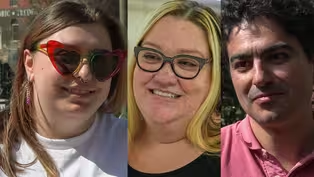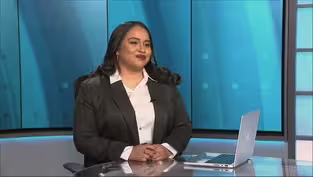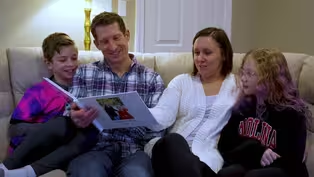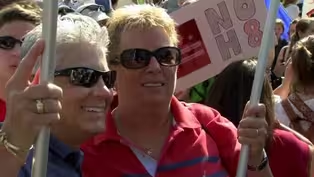VPM News Focal Point
Reflecting with relief on how far they’ve come
Clip: Season 2 Episode 3 | 4m 27sVideo has Closed Captions
The LGBTQ+ community is growing as public acceptance increases
New polling shows more people than ever identify as LGBTQ+. Gender diverse individuals, as well as those who study gender diversity, say society has become more accepting but that full equality is still elusive for some.
Problems playing video? | Closed Captioning Feedback
Problems playing video? | Closed Captioning Feedback
VPM News Focal Point is a local public television program presented by VPM
The Estate of Mrs. Ann Lee Saunders Brown
VPM News Focal Point
Reflecting with relief on how far they’ve come
Clip: Season 2 Episode 3 | 4m 27sVideo has Closed Captions
New polling shows more people than ever identify as LGBTQ+. Gender diverse individuals, as well as those who study gender diversity, say society has become more accepting but that full equality is still elusive for some.
Problems playing video? | Closed Captioning Feedback
How to Watch VPM News Focal Point
VPM News Focal Point is available to stream on pbs.org and the free PBS App, available on iPhone, Apple TV, Android TV, Android smartphones, Amazon Fire TV, Amazon Fire Tablet, Roku, Samsung Smart TV, and Vizio.
Providing Support for PBS.org
Learn Moreabout PBS online sponsorship(glasses clink) JERRY WILLIAMS: Thank you so much, Mark, for getting the glasses.
ANGIE MILES: Jerry Williams and Mark Reed still love sharing the story of how they met.
(glasses clink) JERRY WILLIAMS: We met in January of 1990 at the YMCA.
But before you get the wrong impression, he was a lifeguard and I was swimming.
I wasn't drowning, but I went in and we started a conversation.
And our first date was at the Little Yogurt Shop in Carytown.
In 2013, when it became legal, we went to Baltimore and got legally married.
So we've been married almost ten years legally.
ANGIE MILES: The Richmond couple has been together for 33 years and feel fortunate to be surrounded by an accepting community.
JERRY WILLIAMS: I mean, I've been out since the seventies and technically, as far as I know, it's never been a problem.
I'm not aware of ever having actually been discriminated against because I was gay, so I don't know if it's just because I was lucky or what.
ANGIE MILES: But it wasn't always that way.
Especially for Mark, who grew up in a small Virginia town.
MARK REED: People, including me, were bullied.
Gym class.
Everywhere.
JERRY WILLIAMS: Oh, we all hated gym class.
MARK REED: Glasses.
I wore glasses.
I'm tiny.
If I were anything like I am now (laughs) or spoke out or did anything, I could have been in, you know, a ditch or beaten up.
ANGIE MILES: And the couple has had a considerable share of struggle because of long standing laws against same sex unions.
JERRY WILLIAMS: I was self-employed, paying $1,000 a month for health insurance.
Once I did get on his plan, it went down to $350 a month.
Twenty something years when we couldn't legally be married.
I was paying $1,000 a month.
MARK REED: I resent that we were not able to get married in my state where I was born and I grew up.
I resent that my husband did not get benefits for all those years.
CHARLOTTE PATTERSON: It's really an interesting new finding that Gallup polling has reported.
ANGIE MILES: University of Virginia researcher Charlotte Patterson says she, too, has seen remarkable change in how the general public views gender diverse individuals.
In fact, more Americans than ever view themselves as part of the LGBTQIA+ community.
Gallup shows a record 7.1% of people identify with one or more of these letters.
For those who don't, it can be confusing to know what the variations mean.
CHARLOTTE PATTERSON: Usually, when you think about gay and lesbian, you're thinking about sexual orientation.
Who are you attracted to?
Who would you like to have a date with?
Gender identity, of course, is something quite different.
It's, What gender are we?
Are we male or female?
For most people, that's a pretty clear question.
For some people, it isn't, and perhaps the answer is both.
So nonbinary is a term that can cover male some of the time female some of the time or in the middle all the time.
ANGIE MILES: There's also I.
For Intersex.
People who are born with genitalia that doesnt match the customary biology of girls or boys.
And A.
For Asexual individuals.
people who don't feel sexual attraction for others.
There are basically two different ways to consider gender diversity.
One set of labels is for those who feel their identity is not a match to what they were assigned based on appearance at birth.
Others consider themselves sexual minorities based on attraction.
CHARLOTTE PATTERSON: LGBTQ.
Q. Queer.
You might think of it as an umbrella term for all the things that we've already mentioned that you can be queer and fit within that spectrum of gender and sexual identities.
Why are so many people identifying as gender diverse now?
The research is not conclusive.
CHARLOTTE PATTERSON: Why are some people CIS gender and other people not?
We don't really know, but I'm a lot more interested in questions like, “How can we help people be the best versions of themselves?
” I think that's a probably more important question in the short term for researchers to look at.
JERRY WILLIAMS: You know, it's an interesting situation because in some ways we've come so far and so many people you say, ‘I'm gay.
So what?
Who cares?
MARK REED: The whole world has changed dramatically from where I grew up.
It's been a road to get there, (laughs) to feel good and whole within myself, you know?
So, let people do that.
Gender and Identity | People of Virginia
Video has Closed Captions
Clip: S2 Ep3 | 1m 13s | People of Virginia discuss gender, identity and legal protections for the LGBTQ community. (1m 13s)
In Focus | Dr. Erica Anderson and Narissa Rahaman
Video has Closed Captions
Clip: S2 Ep3 | 15m 28s | Narissa Rahaman and Dr. Erica Anderson discuss school policies in Virginia for LGBTQ youth (15m 28s)
Parenting trans youth in a contentious political climate
Video has Closed Captions
Clip: S2 Ep3 | 7m 57s | Why is parental support so important for the health and safety of transgender youth? (7m 57s)
Protecting the right to same-sex marriage in Virginia
Video has Closed Captions
Clip: S2 Ep3 | 1m 38s | Virginia’s constitution bans same sex marriage, while federal law protects that right. (1m 38s)
Richmond Triangle Players Celebrates Queer Artistry
Video has Closed Captions
Clip: S2 Ep3 | 3m 31s | Founded in ‘93 Richmond Triangle Players celebrates queer artistry and LGBTQ+ experiences. (3m 31s)
Supporting families with transgender loved ones
Video has Closed Captions
Clip: S2 Ep3 | 8m 17s | He She Ze and We supports families with transgender loved ones. (8m 17s)
Providing Support for PBS.org
Learn Moreabout PBS online sponsorship
- News and Public Affairs

Top journalists deliver compelling original analysis of the hour's headlines.

- News and Public Affairs

FRONTLINE is investigative journalism that questions, explains and changes our world.












Support for PBS provided by:
VPM News Focal Point is a local public television program presented by VPM
The Estate of Mrs. Ann Lee Saunders Brown





